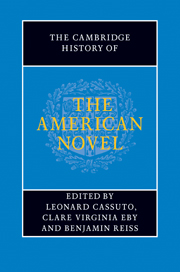Book contents
- Frontmatter
- General Introduction
- PART ONE INVENTING THE AMERICAN NOVEL
- PART TWO REALISM, PROTEST, ACCOMMODATION
- Introduction: realism, protest, accommodation
- 17 Realism and radicalism: the school of Howells
- 18 James, pragmatism, and the realist ideal
- 19 Theories of the American novel in the age of realism
- 20 The novel in postbellum print culture
- 21 Twain, class, and the Gilded Age
- 22 Dreiser and the city
- 23 Novels of civic protest
- 24 Novels of American business, industry, and consumerism
- 25 New Americans and the immigrant novel
- 26 Cather and the regional imagination
- 27 Wharton, marriage, and the New Woman
- 28 The postbellum race novel
- 29 The African American novel after Reconstruction
- 30 The rise of naturalism
- 31 Imagining the frontier
- 32 Imperialism, Orientalism, and empire
- 33 The hemispheric novel in the post-revolutionary era
- 34 The woman's novel beyond sentimentalism
- 35 Dime novels and the rise of mass-market genres
- 36 Readers and reading groups
- PART THREE MODERNISM AND BEYOND
- PART FOUR CONTEMPORARY FORMATIONS
- A selected bibliography
- Index
32 - Imperialism, Orientalism, and empire
from PART TWO - REALISM, PROTEST, ACCOMMODATION
Published online by Cambridge University Press: 28 July 2011
- Frontmatter
- General Introduction
- PART ONE INVENTING THE AMERICAN NOVEL
- PART TWO REALISM, PROTEST, ACCOMMODATION
- Introduction: realism, protest, accommodation
- 17 Realism and radicalism: the school of Howells
- 18 James, pragmatism, and the realist ideal
- 19 Theories of the American novel in the age of realism
- 20 The novel in postbellum print culture
- 21 Twain, class, and the Gilded Age
- 22 Dreiser and the city
- 23 Novels of civic protest
- 24 Novels of American business, industry, and consumerism
- 25 New Americans and the immigrant novel
- 26 Cather and the regional imagination
- 27 Wharton, marriage, and the New Woman
- 28 The postbellum race novel
- 29 The African American novel after Reconstruction
- 30 The rise of naturalism
- 31 Imagining the frontier
- 32 Imperialism, Orientalism, and empire
- 33 The hemispheric novel in the post-revolutionary era
- 34 The woman's novel beyond sentimentalism
- 35 Dime novels and the rise of mass-market genres
- 36 Readers and reading groups
- PART THREE MODERNISM AND BEYOND
- PART FOUR CONTEMPORARY FORMATIONS
- A selected bibliography
- Index
Summary
The foreign locales that crop up in US literature show that only rarely could a history of “the American novel” claim to be a story, to borrow a title from Mark Twain, of “innocents abroad. ” For what invocations of Havana, Constantinople, Cuba, and Peking – just to mention a few of the geographically far-flung sites that reappear throughout the literature of the nineteenth and early twentieth centuries – make clear is that white Americans were hardly guiltless when it came to imperial adventures. For quite a long time, however, accepted historical narratives cast the USA as a nation without an imperial tradition, one whose hands were unsullied by the sort of history that bloodied traditional European powers. In early examples of imperial romances from the first half of the nineteenth century, dashing heroes and sentimental heroines embody this uncomplicated history, their sexual innocence and purity expressive of a fantasy that white subjectivity could remain untainted by the stain of moral, political, and cultural complications that US culture inevitably confronted as white men and women courted one another on the slave-trading African coast, the exotic climes of the Levant, or other presumably romantic backdrops. Examples from later in the nineteenth century and continuing into the first decades of the twentieth lend a scientific hue to this fantasy, rooting the quest for cultural purity in biology as part of an effort to control the linkages among race, sexuality, and empire that empowered but also potentially jeopardized white subjects.
- Type
- Chapter
- Information
- The Cambridge History of the American Novel , pp. 537 - 552Publisher: Cambridge University PressPrint publication year: 2011
- 1
- Cited by



